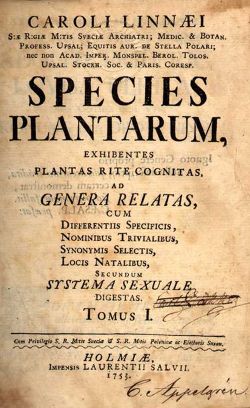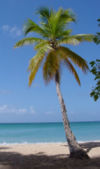القانون العالمي لتسمية الطحالب والفطريات والنباتات

القانون العالمي لتسمية الطحالب والفطريات والنباتات International Code of Nomenclature for algae, fungi, and plants (ICN) هو مجموعة من القواعد والتوصيات التي تتعامل مع the formal botanical names that are given to plants, fungi and a few other groups of organisms, all those "traditionally treated as algae, fungi, or plants".[1] It was formerly called the International Code of Botanical Nomenclature (ICBN); the name was changed at the International Botanical Congress in Melbourne in July 2011 as part of the Melbourne Code which replaces the Vienna Code of 2005. As with previous codes, it takes effect as soon as ratified by the congress (on Saturday 23 July 2011), but the documentation of the code in its final form takes some time to prepare after the congress. Preliminary wording of some of the articles with the most significant changes has been published in September 2011.[2]
. . . . . . . . . . . . . . . . . . . . . . . . . . . . . . . . . . . . . . . . . . . . . . . . . . . . . . . . . . . . . . . . . . . . . . . . . . . . . . . . . . . . . . . . . . . . . . . . . . . . . . . . . . . . . . . . . . . . . . . . . . . . . . . . . . . . . . . . . . . . . . . . . . . . . . . . . . . . . . . . . . . . . . . .
المبادئ
- Botanical nomenclature is independent of zoological, bacteriological, and viral nomenclature (see Nomenclature codes).
- A botanical name is fixed to a taxon by a type.[1] This is almost invariably dried plant material and is usually deposited and preserved in a herbarium, although it may also be an image or a preserved culture. Some type collections can be viewed online at the websites of the herbaria in question.
- A guiding principle in botanical nomenclature is priority, the first publication of a name for a taxon.[1] The formal starting date for purposes of priority is 1 May 1753, the publication of Species Plantarum by لينايوس. However, to avoid undesirable (destabilizing) effects of strict enforcement of priority, conservation of family, genus, and species names is possible.
- The intent of the Code is that each taxonomic group ("taxon", plural "taxa") of plants has only one correct name that is accepted worldwide, provided that it has the same circumscription, position and rank.[1] The value of a scientific name is that it is an identifier; it is not necessarily of descriptive value.
- Names of taxa are treated as Latin.
- The rules of nomenclature are retroactive unless there is an explicit statement that this does not apply.
التاريخ
The rules governing botanical nomenclature have a long and tumultuous history, dating back to dissatisfaction with rules that were established in 1843 to govern zoological nomenclature.[3] The first set of international rules was the Lois de la nomenclature botanique ("Laws of botanical nomenclature") that was adopted as the "best guide to follow for botanical nomenclature"[3] at an "International Botanical Congress" convened in Paris in 1867.[4][5] Unlike modern codes, it was not enforced. It was organized as six sections with 68 articles in total.
Multiple attempts to bring more "expedient" or more equitable practice to botanical nomenclature resulted in several competing codes, which finally reached a compromise with the 1930 congress.[3] In the meantime, the second edition of the international rules followed the Vienna congress in 1905. These rules were published as the Règles internationales de la Nomenclature botanique adoptées par le Congrès International de Botanique de Vienne 1905 (or in English, International rules of Botanical Nomenclature adopted by the International Botanical Conference of Vienna 1905). Informally they are referred to as the Vienna Rules (not to be confused with the Vienna Code of 2006).
Some but not all subsequent meetings of the International Botanical Congress have produced revised versions of these Rules, later called the International Code of Botanical Nomenclature. Some important versions are listed below.
| سنة الاتخاذ | الاسم غير الرسمي |
|---|---|
| 1905 | قواعد ڤيينا |
| 1935 | قواعد كمبردج |
| 1952 | Stockholm Code |
| 1969 | Seattle Code |
| 1975 | Leningrad Code |
| 1981 | Sydney Code |
| 1987 | Berlin Code |
| 1993 | Tokyo Code |
| 1999 | St Louis Code, The Black Code |
| 2005 | Vienna Code |
| 2011 | Melbourne Code (current, supersedes all previous codes) |
The Nomenclature Section held just before the 18th International Botanical Congress in Melbourne, Australia in July 2011 saw sweeping changes to the way scientists name new plants, algae, and fungi.[6][7][8]
- For the first time in history the Code now permits electronic-only publication of names of new taxa; no longer will it be a requirement to deposit some paper copies in libraries.
- The requirement for a Latin validating diagnosis or description was changed to allow either English or Latin for these essential components of the publication of a new name (Article 39).
- "One fungus, one name" and "one fossil, one name" are important changes for fungi and for fossils; the concepts of anamorph and teleomorph (for fungi) as well as morphotaxa (for fossils) have been eliminated.
- As an experiment with "registration of names", new fungal descriptions will require the use of an identifier from "a recognized repository"; there are two recognized repositories so far, Index Fungorum[9] and MycoBank.
- The title of the Code was broadened to make explicit that it applies not only to plants, but also to algae and fungi.
انظر أيضاً
مختص بعلم النبات
- Author citation (botany)
- Botanical name
- Botanical nomenclature
- Correct name (botany)
- Infraspecific name (botany)
- Hybrid name (botany)
أكثر عموماً
- Glossary of scientific naming
- Binomial nomenclature
- Nomenclature codes
- Scientific classification
- Undescribed species
الهامش
- ^ أ ب ت ث McNeill, J., ed. (2012). International Code of Nomenclature for algae, fungi, and plants (Melbourne Code), Adopted by the Eighteenth International Botanical Congress Melbourne, Australia, July 2011 (electronic ed.). Bratislava: International Association for Plant Taxonomy. Retrieved 2012-12-20
{{cite book}}: Unknown parameter|displayeditors=ignored (|display-editors=suggested) (help); Unknown parameter|lastauthoramp=ignored (|name-list-style=suggested) (help)CS1 maint: postscript (link). - ^ Knapp, S.; McNeill, J.; Turland, N.J. (2011). "Changes to publication requirements made at the XVIII International Botanical Congress in Melbourne - what does e-publication mean for you?". PhytoKeys. 6 (0): 5–11. doi:10.3897/phytokeys.6.1960. PMC 3261035. PMID 22287918.
{{cite journal}}: CS1 maint: multiple names: authors list (link) CS1 maint: unflagged free DOI (link) - ^ أ ب ت Nicolson, D.H. (1991). "A History of Botanical Nomenclature". Annals of the Missouri Botanical Garden. 78 (1): 33–56. doi:10.2307/2399589. JSTOR 2399589.
- ^ Alphonse Pyramus de Candolle (1867). Lois de la nomenclature botanique adoptées par le Congrès International de Botanique tenu à Paris en août 1867 suivies d'une deuxième édition de l'introduction historique et du commentaire qui accompagnaient la rédaction préparatoire présentée au congrès. Genève et Bale: J.-B. Baillière et fils.
- ^ Alphonse Pyramus de Candolle (1868). Laws of Botanical Nomenclature adopted by the International Botanical Congress held at Paris in August 1867; together with an Historical Introduction and Commentary by Alphonse de Candolle, Translated from the French. translated by Hugh Algernon Weddell. London: L. Reeve and Co.
- ^ Miller JS, Funk VA, Wagner WL, Barrie F, Hoch PC, Herendeen P (2011). "Outcomes of the 2011 Botanical Nomenclature Section at the XVIII International Botanical Congress". PhytoKeys. 5 (5): 1–3. doi:10.3897/phytokeys.5.1850. PMC 3174450. PMID 22171188.
{{cite journal}}: CS1 maint: multiple names: authors list (link) CS1 maint: unflagged free DOI (link) - ^ John McNeill, 2011. Important decisions of the Nomenclature Section of the XVIII International Botanical Congress, Melbourne, 18–22 July 2011. Botanical Electronic News, ISSN 1188-603X, 441
- ^ Botanists finally ditch Latin and paper, enter 21st century, Hannah Waters, Scientific American blog, December 28, 2011
- ^ "Index Fungorum Registration".

